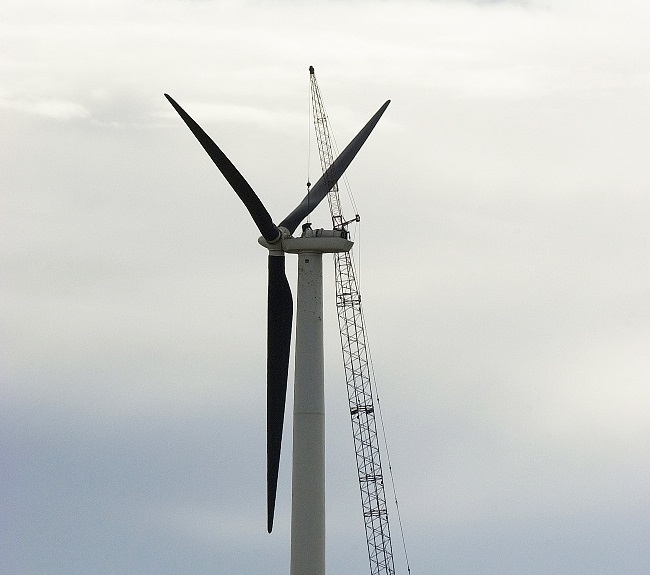Four hours of debate — and 50 proposed amendments — but climate and energy omnibus approved

Is renewable energy cheaper, cleaner and capable of making Minnesota a more self-sufficient state? Or is it dirty, inefficient and expensive?
It depends upon who you ask. But it seems to be the direction the vast majority of electrical utilities are going. And moving Minnesota’s energy production and use toward a carbon-free future is the overriding focus of the omnibus climate and energy finance bill.
The bill, as amended, was approved by the House Climate and Energy Finance and Policy Committee Friday, but not before navigating through 50 proposed amendments and four hours of debate that stretched over two days.
Sponsored by Rep. Jamie Long (DFL-Mpls), HF2110 was replaced by a delete-all amendment and approved by the committee on a 9-6 party-line vote. Its next stop is the House Ways and Means Committee.
[MORE: View the spreadsheet]
The bill, which received a detailed description at a Tuesday hearing, funds most of its appropriations with money from the Renewable Development Account. That state-administered fund is designed expressly for the purpose of developing renewable energy sources in Minnesota, its money coming from annual fees of between $350,000 and $500,000 paid by Xcel Energy for each cask of nuclear waste it stores at its Prairie Island and Monticello facilities.
Policy provisions related to energy conservation, storage issues, energy transition, climate change, electric vehicles, and solar energy are in the bill. Among its appropriations are grants for the Prairie Island Indian Community’s move toward a “net zero” emissions goal, electric vehicle rebates and cleaning up petroleum tank leaks.
Long successfully offered a mostly technical amendment and an oral amendment to fix an incorrect date. Two more amendments were adopted related to making electric vehicle charging stations available at county government centers, clarifying that vehicle owners are charged for the charge and that the stations are in public portions of the property.
But 38 other amendments were defeated, seven withdrawn and two ruled out of order. The most common topics of the unsuccessful amendments were putting specific caps on energy costs, modifying the state’s Conservation Improvement Program, and mandating local ownership and increased regulation of community solar gardens.
A proposed amendment from Rep. Glenn Gruenhagen (R-Glencoe) that would remove the word “clean” from the bill and replace it with “dirty, inefficient and expensive” struck a nerve with Long.
“The utilities are moving toward clean energy because it is cheaper,” Long said. “Fifteen, 20 years ago, you might have been right, Rep. Gruenhagen. It was more expensive. But, right now, it is cheaper.
“And if we’re talking about which energy is clean and which energy is dirty, renewable sources don’t need nuclear waste storage. They don’t produce 10,000 years of nuclear waste. They don’t cause asthma or premature death in our communities. As I have mentioned earlier, 2,000 cases of premature death in the Twin Cities every single year are from polluting sources of energy. Renewable energy doesn’t do that. Renewable energy doesn’t spill oil. Renewable energy doesn’t create toxic coal ash in our communities. … Those who are supporting dirty fossil fuel energies are going to be left in the dust, because we know that those are the energies of the past.”
While most of the proposed amendments were defeated by voice vote or along party lines, there was some crossover on the subject of mining. Rep. Mary Franson (R-Alexandria) frequently mentioned while proposing amendments the reported use of child and slave labor in the mining of minerals used in cellphones, computers, solar panels and batteries.
Rep. Spencer Igo (R-Grand Rapids) suggested opening up the northern part of the state to more mining for iron, copper and nickel. Rep. Dave Lislegard (DFL-Aurora) supported amendments to that effect (all defeated), while Igo joined DFLers in voting down an amendment that would strip the bill of prevailing wage language in renewable energy projects.
Addressing the issue of Northern Minnesota jobs, Long noted that the bill contains $5.5 million in appropriations to aid a manufacturer’s expansion in Mountain Iron that would make it the nation’s second largest producer of solar panels.
The bill’s companion, SF2075, is sponsored by Sen. David Senjem (R-Rochester). It was approved Wednesday, as amended, by the Senate Energy and Utilities Finance and Policy Committee, and has been re-referred to the Senate Finance Committee.
Related Articles
Search Session Daily
Advanced Search OptionsPriority Dailies
Ways and Means Committee OKs proposed $512 million supplemental budget on party-line vote
By Mike Cook Meeting more needs or fiscal irresponsibility is one way to sum up the differences among the two parties on a supplemental spending package a year after a $72 billion state budg...
Meeting more needs or fiscal irresponsibility is one way to sum up the differences among the two parties on a supplemental spending package a year after a $72 billion state budg...
Minnesota’s projected budget surplus balloons to $3.7 billion, but fiscal pressure still looms
By Rob Hubbard Just as Minnesota has experienced a warmer winter than usual, so has the state’s budget outlook warmed over the past few months.
On Thursday, Minnesota Management and Budget...
Just as Minnesota has experienced a warmer winter than usual, so has the state’s budget outlook warmed over the past few months.
On Thursday, Minnesota Management and Budget...
